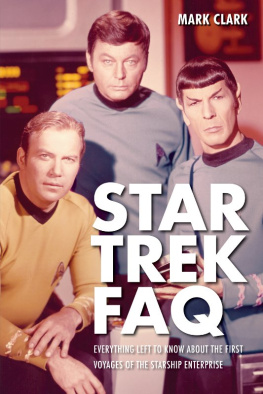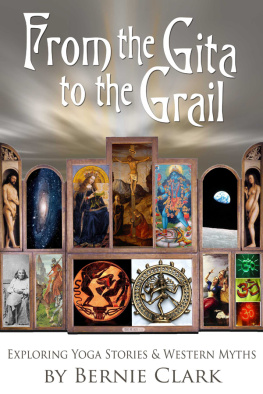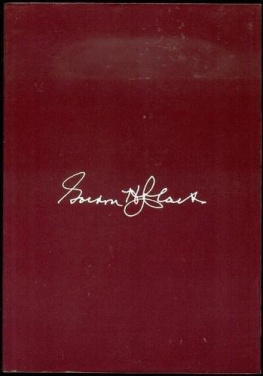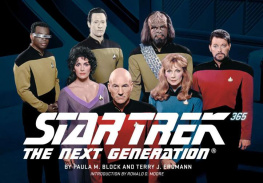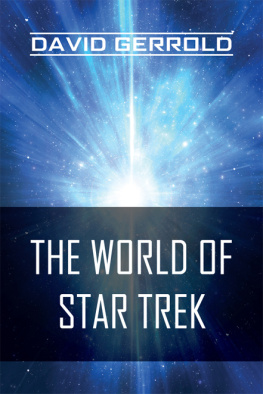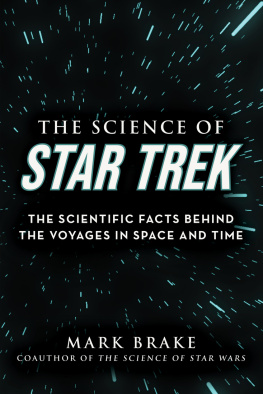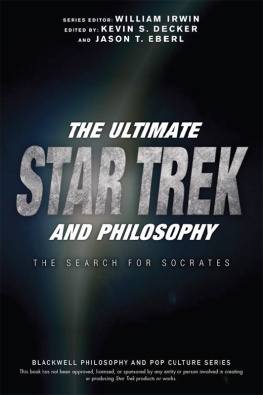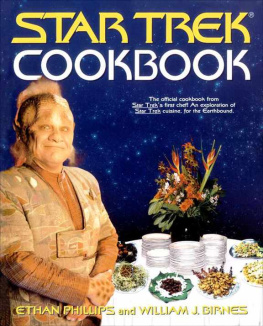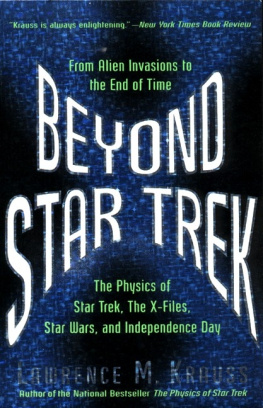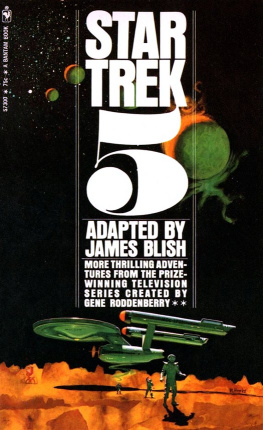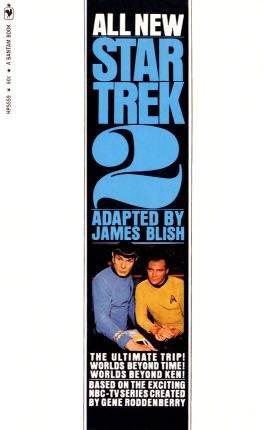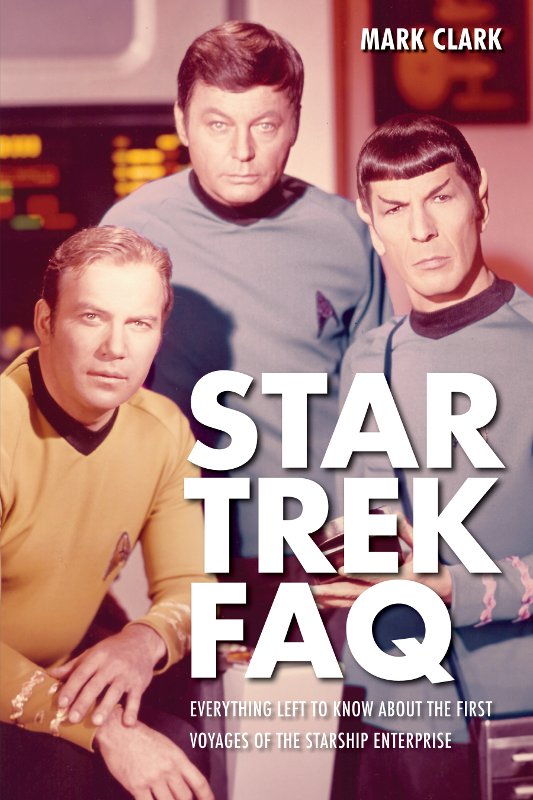
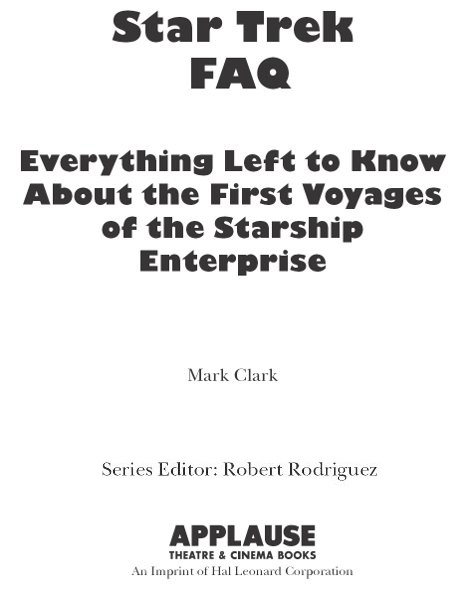
Copyright 2012 by Mark Clark
All rights reserved. No part of this book may be reproduced in any form, without written permission, except by a newspaper or magazine reviewer who wishes to quote brief passages in connection with a review.
Published in 2012 by Applause Theatre & Cinema Books
An Imprint of Hal Leonard Corporation
7777 West Bluemound Road
Milwaukee, WI 53213
Trade Book Division Editorial Offices
33 Plymouth St., Montclair, NJ 07042
The FAQ series was conceived by Robert Rodriguez and developed with Stuart Shea.
Star Trek is a registered trademark of Paramount Pictures Corporation.
All photos are vintage publicity stills from the authors collection, except as noted.
Printed in the United States of America
Book design by Snow Creative Services
Library of Congress Cataloging-in-Publication Data
Clark, Mark, 1966
Star trek FAQ : everything left to know about the first voyages of the Starship Enterprise / by Mark Clark.
p. cm.
Includes .
1. Star trek (Television program)Miscellanea. I. Title.
PN1992.77.S73C525 2012
791.4572dc23
2012002348
www.applausebooks.com
For Vanessa, my favorite Trekaholic
Contents
So much has been written and said about Star Trek in all of its various shapes and forms and incarnations that it may be time to declare some kind of moratorium. Perhaps congressional action is necessary to protect the environment.
At the last Trek convention I attended, several dealers had huge tables of nothing but Star Trek books. Six TV series and eleven movies have generated hundreds of production diaries, tell-all memoirs, novels, spin-offs, anthologies, comics, quote books, dictionaries, encyclopedias, dissertations, deconstructions, psychoanalyses, metaphorical interpretations, and ride-along tie-ins of all kinds.
In addition to that, there have been thousands of articles, reviews, essays, studies, and even college-level courses. There have been hundreds of conventions and thousands of panel discussions. There are an uncountable number of websites about Trek, about all the various aspects of its production and all the people connected to it. There are websites on how to build costumes and props and sets and how to create CGI models of all the different starships. There are hundreds of videos of parodies and dozens of professional-level fan productions.
Maybe its time to call in the EPA. A new Star Trek movie or TV series will cause whole forests to be plowed under, cause the sea level to rise, and deplete the oxygen levels of this planet. I fear for the future of humanity!
Okay, and maybe I had too much coffee this morning, too.
The important thing here is that a lot has been said about Star Trek and a lot of the stuff said about Star Trek has been like a game of Russian telephone. You know the game. You get a long line of people, and the first person whispers a phrase into the second persons ear. The second person whispers to the third, and the phrase gets passed from one person to the next, all the way down the line, until it gets to the last person. And what originally started out as We hold these truths to be self evident comes back as Behold! Ruth sees an elephant!
Its been more than forty-five years since the first episode of Star Trek aired (September 8, 1966. NBC, 8:30 p.m.). Looking back is like looking through the wrong end of a telescope. Every day that passes, the image gets a little smaller, a little more distant. The facts become a little more blurred. The details get fuzzed. People make up things to explain what they dont know for sure. Whole mythologies grow and take on a life of their own in books and essays and websites and blogs. You are justified in being skeptical.
You hold in your hands the latest iteration. And I encourage you to bring skepticism to this effort as well. Fortunately, Mark Clark has done a great deal of research, and theres a lot more evidence here and a lot less elephant.
This is not the last word on Star Trek. I doubt well ever get the last word, but as words go, this is a good collection of them, and it will serve as a useful reference for anyone needing a good overview on the production of the first Star Trek TV series, the one that started it all. Youll see that for yourself, once you dive in.
But theres something else that needs to be said here, something much more important than any collection of facts, no matter how skillful the collectionStar Trek may have begun as a television show, but it has become something enormously greater than that. It has become a defining piece of American culture.
As a TV series, Star Trek was an occasionally clumsy, almost quaint vision of the futurebut it also served as a running commentary on twentieth-century society. The 60s were a time of enormous cultural upheavala new generation was coming of age, the Cold War was threatening to heat up, a long-simmering civil rights struggle had finally come to a boil, the nation was entangled in a terrible war in Vietnam, drug use had become pandemic, and the sexual revolution was beginning to change the way men and women regarded each other. And those things were just the tip of the iceberg.
American television, always courageously avoiding any kind of controversy that might upset the viewers, stepped up to the challenge of the times and gave us seriously thought-provoking entertainment like Bewitched, I Dream of Jeannie, Gilligans Island, The Beverly Hillbillies, Petticoat Junction, Green Acres, The Flying Nun, and Mr. Ed.
Meanwhile, over at the Desilu lot, there was this barely noticed little show that took place in some distant future and on far-off planets, so it wasnt really about us, was it? It was just more of that sci-fi stuff. It had a spaceship and a guy with pointy ears and pretty women in revealing costumes. You didnt have to take it seriously, did you? And it wasnt pulling an enormous rating, so the network wasnt paying very close attention to it.
So Gene Roddenberry, Gene L. Coon, D. C. Fontana, and about fifty other authors took advantage of that freedom to write stories about mutual assured destruction, the insanities of war, overpopulation, racial madness, drug use, brainwashing, cults, cultural meddling, hippie dropouts, sexual identity, and even our fundamental relationship with God. (Oh, and one odd little comedy about an invasive species in a closed ecology.)
Nobody else on television was tackling such enormous subjects. Few other shows were challenging the audience to actually think about things. Indeed, the great disgrace of the American television industry of the 60s was just how much the studios, the networks, and the producers underestimated their audiences.
Star Trek was a subversive show. It challenged the audience to think about things. Its episodes were easily digestible morality playsthe crew of the starship challenged the circumstances and were challenged in turn. They juggled logic against emotion before taking actionand always, always, they learned something in the process.
I believe this is the primary reason why Star Trek has had such a profound effect on its audience. Just as the crew of the Enterprise were challenged each week, so was the audience itself challenged to consider the morality and the ethics of the issue.
Next page
